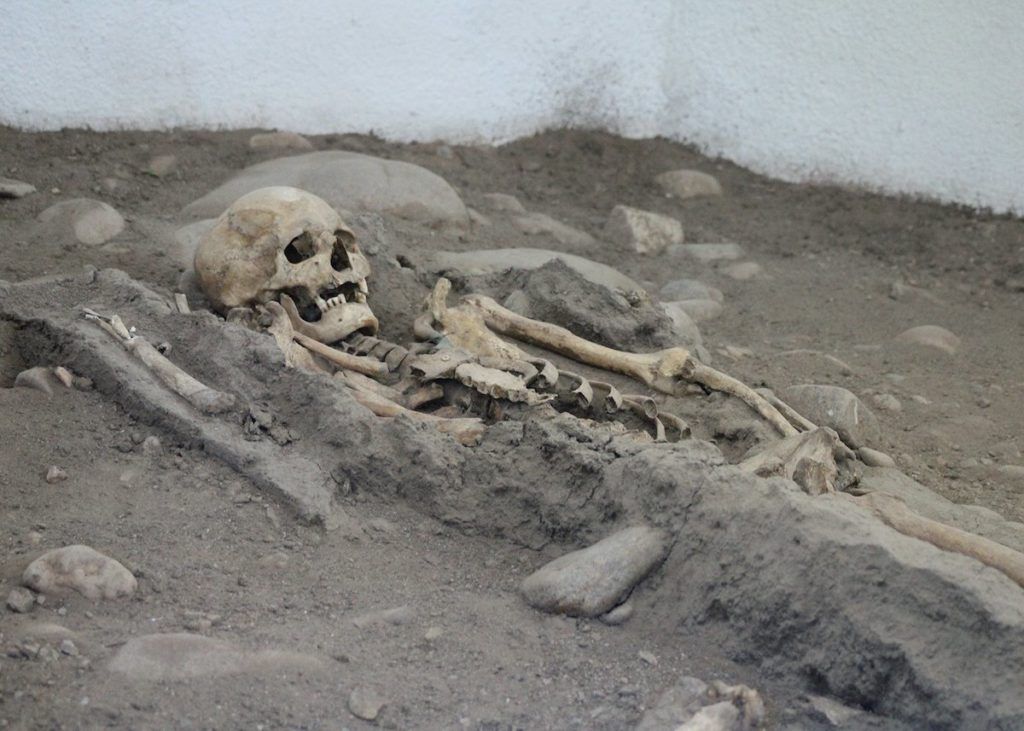
By Tony Gutiérrez, Catholic News Service
MAGDALENA DE KINO, Mexico (CNS) — As the cause for canonization of Jesuit Father Eusebio Francisco Kino — popularly referred to as “Padre Kino” and known as the “Padre on Horseback” — continues to progress, a small group from Arizona visited the famed missionary’s remains in Magdalena de Kino, Mexico, to create third-class relics for distribution.
Led by Jesuit Father Greg Adolf, pastor of St. Andrew the Apostle Parish in Sierra Vista, Arizona, and spiritual moderator for the Tucson-based Kino Heritage Society, the delegation brought several rolls of thin ribbon to the crypt at Plaza Monumental Eusebio Francisco Kino March 30 to be placed on Padre Kino’s bones.
The ribbons are then to be cut up and attached to 20,000 prayer cards to be distributed to parishes and others who may request them. The crypt containing Padre Kino’s remains have plexiglass windows allowing visitors and pilgrims to view and venerate the relics from above, but the crypt is rarely opened.
“I’ve seen the remains many times through the plexiglass, but to have the crypt open and to be on the ground looking at Father Kino’s remains was very moving (and) touching,” said Father Adolf. “To have that door swing open and be able to gaze in that way was a fantastic experience.”

With the support of Rafael Barceló Durazo, Mexico’s consul in Tucson, the delegation coordinated the effort with the Instituto Nacional de Antropología e Historia, or INAH — the country’s historical and anthropological institute. Rodolfo del Castillo López, a restorer from INAH’s Sonora center in Hermosillo, opened the crypt and placed the ribbons on Padre Kino’s skull, formally making them third-class relics. Del Castillo and Father Adolf then signed the rolls, certifying they had touched the missionary priest’s bones.
“I felt very fortunate and thankful that we were invited because how many people get to be close to the bones and be able to take pictures and peak inside and see it, not through the glass?” asked Lupita Teran, parish receptionist at St. Andrew who, along with her husband Deacon Lauro Teran, was a part of the delegation. “What an amazing thing, when he is declared a saint, to be able to say that I was there, and I saw him up close.”
Padre Kino was declared venerable in 2020, which put him on the path to being named a saint.
The priest was born in 1645 in Segno, Italy, and ordained as a Jesuit in 1677. He set out for Mexico the following year and went on to introduce Christianity to present-day Arizona, establishing missions there and in Mexico and California. Padre Kino always traveled in a group, said Father Adolf, dispelling the idea that he worked alone.
“He was a bridge builder, so he had this enormous capacity for friendship,” said Father Adolf. “Kino had such enormous friendships with so many of the Native Americans, and he regarded them as collaborators in his explorations.”
Adriana Moreno Salazar, assistant director of Art, Culture, and Tourism for Magdalena de Kino, said that opening the crypt and creating the relics will have a positive impact on the community.
“We’re grateful for Padre Kino because he was a great missionary and because he raised our pueblo,” said Moreno in Spanish. “He was the one that came to be with the original people. He was the one who dealt with them, spoke with them and built a partnership with them to build our city into what it is today.”
Ignacio Rodriguez, associate director of the Office of Ethnic Ministries for the Diocese of Phoenix, first visited Padre Kino’s crypt when that diocese started a partnership with the Diocese of Tucson and the Archdiocese of Hermosillo to pray and find a way to work collaboratively in ministry to immigrants.
He said he hopes Padre Kino’s cause will bring a sense of renewal and evangelization to the work that’s being done at the border.
“We’re called to evangelization, we’re called to remind people of God’s love, and we’re reminded to share the Good News with folks who are suffering,” he said.
“Ultimately, that’s what Father Kino was doing,” he added. “The establishment of missions throughout this country speaks volumes for his love of people who are on the margins.”






